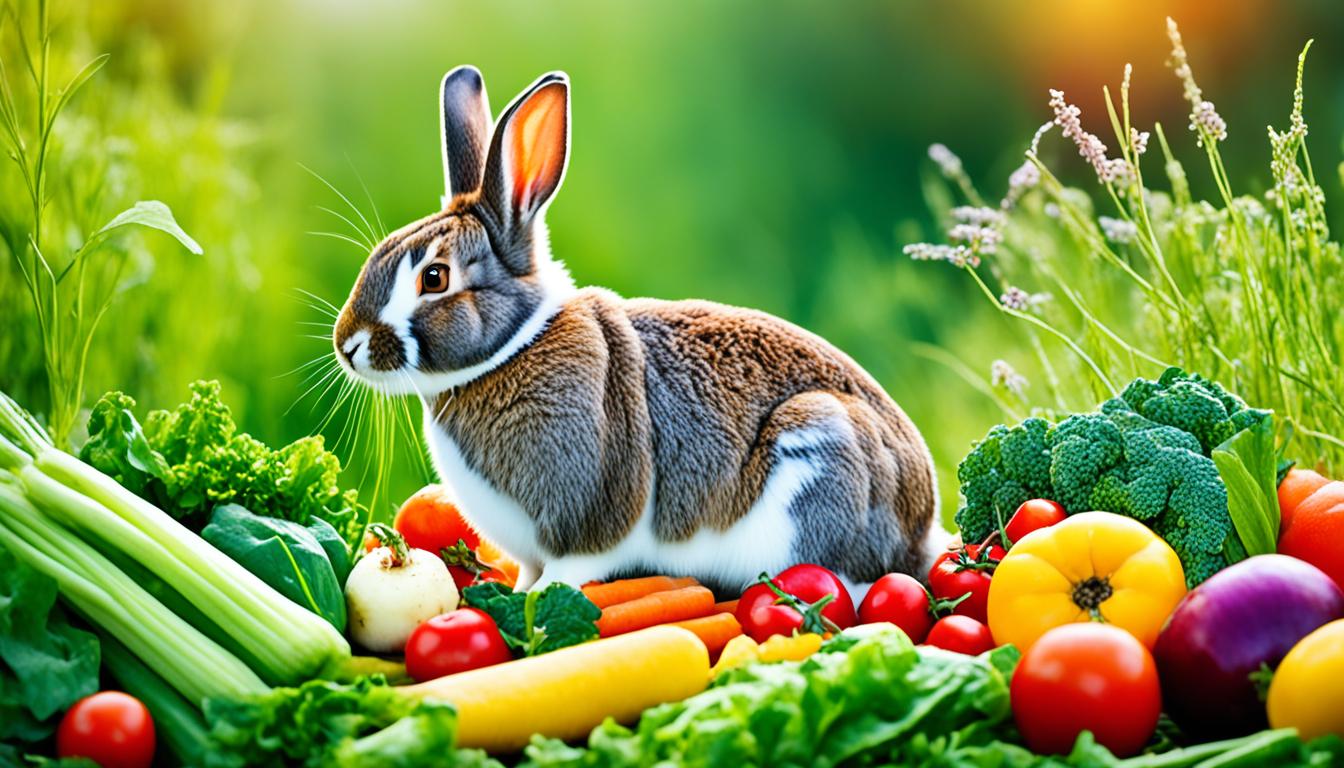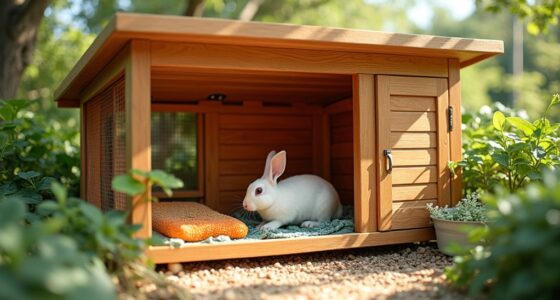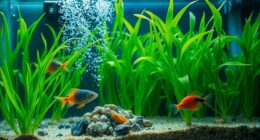Rabbits have a distinctive digestive system that necessitates close monitoring of their diet. Certain foods can be harmful or even toxic to rabbits if consumed. It is crucial for rabbit owners to know about these foods to ensure the well-being and safety of their beloved pets.
Rabbits are herbivores and their diet should primarily consist of fresh hay, high-quality pellets, and a variety of fresh fruits and vegetables. However, there are certain foods that should be avoided to prevent any potential health issues in rabbits.
Key Takeaways:
- Avoid giving rabbits yogurt drops and other high-sugar treats as they can disrupt their digestion.
- Never include avocado in a rabbit’s diet as it can cause breathing trouble and heart complications.
- Avoid giving rabbits processed human food like cereal and iceberg lettuce as they can cause tummy problems.
- Hamster food and walnuts should be avoided as they do not provide the necessary nutrition for rabbits.
- Oatmeal, chocolate, and peanut butter should also be avoided as they can cause digestive upset.
Foods to Avoid: Yogurt Drops and High-Sugar Treats
When it comes to treating your rabbit, it’s important to choose their snacks wisely. Some treats can be harmful to their health, so it’s crucial to avoid certain toxic foods and opt for safer alternatives.
Two popular treats that should be avoided are yogurt drops and high-sugar treats. While these may seem like a delicious treat for your furry friend, they can actually have negative effects on their digestive system.
“Yogurt drops and high-sugar treats can potentially lead to enterotoxemia, a toxic overgrowth of ‘bad’ bacteria in the intestinal tract,”
These treats can disrupt your rabbit’s digestion and cause stomach issues. Consuming too much sugar can also lead to weight gain and dental problems. It’s best to avoid these high-sugar treats altogether and look for healthier alternatives.
Instead of yogurt drops and other sugary snacks, consider providing your rabbit with healthier treats. Green peppers and Brussels sprouts are excellent options that are low in sugar and rich in essential nutrients. These treats not only provide a tasty reward, but they also contribute to a balanced diet for your rabbit.
Benefits of Green Peppers:
| Treat | Nutritional Benefits |
|---|---|
| Green Peppers | High in vitamin C, which supports your rabbit’s immune system |
Benefits of Brussels Sprouts:
| Treat | Nutritional Benefits |
|---|---|
| Brussels Sprouts | Rich in fiber, which aids in digestion and promotes overall gut health |
By choosing healthier treats for your rabbit, you can ensure that they receive the necessary nutrients while also avoiding the risks associated with toxic and high-sugar foods. Prioritizing your rabbit’s health and well-being is key to providing them with a happy and fulfilling life.
No Avocado for Rabbits
When it comes to the diet of rabbits, there are certain foods that can be extremely harmful, even deadly, if ingested. One such food that should be strictly avoided is avocado.
Avocado contains a natural chemical compound called persin, which can cause serious health issues for rabbits. The consumption of avocado by rabbits can lead to breathing difficulties and even heart complications. It’s crucial for rabbit owners to understand the dangers of avocado and refrain from including it in their pets’ diet.
Instead of avocado, there are plenty of other fresh fruits and vegetables that can be safely fed to rabbits. These options not only provide essential nutrients but also add variety to their diet. Some rabbit-friendly fruits and vegetables include:
- Leafy greens: Spinach, kale, and parsley
- Berries: Strawberries, blueberries, and raspberries
- Root veggies: Carrots, radishes, and beets
- Herbs: Basil, cilantro, and mint
These alternatives offer a range of flavors and textures that can keep rabbits interested in their meals. Additionally, they provide vital nutrients for their overall health and well-being.
The Dangers of Avocado
Avocado contains the toxic compound persin, which can have severe effects on a rabbit’s health. The chemical is primarily found in the skin, flesh, and even the leaves of the avocado plant.
When rabbits consume avocado, they may experience difficulty breathing due to swelling and irritation of the airways. This can lead to respiratory distress, causing considerable distress and discomfort for the animal.
In some cases, rabbits may also develop heart complications after ingesting avocado. These complications can lead to serious health problems and can even be fatal.
“Avocado should never be included in a rabbit’s diet as it can be deadly if ingested.”
Given the potential risks, it’s essential for rabbit owners to be aware of the dangers associated with avocado consumption and strictly avoid feeding it to their furry companions.
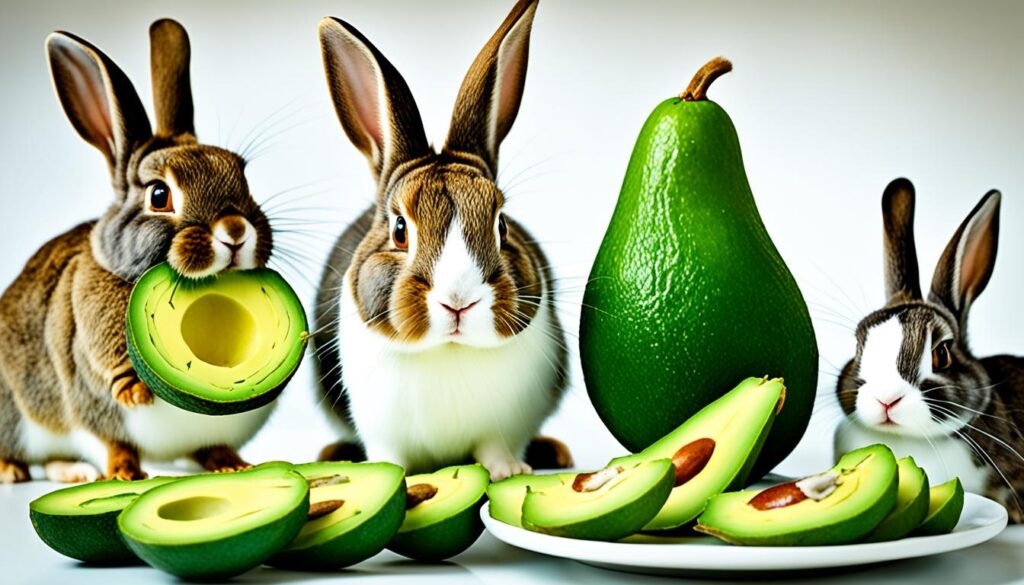
While avocado might be a popular and healthy food choice for humans, it should never be considered safe for rabbits. Their unique digestive system and sensitivity make it crucial to provide them with a carefully planned diet that excludes toxic foods.
By avoiding avocado and sticking to a nourishing and species-appropriate diet, rabbit owners can ensure the health and well-being of their beloved pets for years to come.
Cereal and Lettuce to Avoid
When it comes to feeding rabbits, it’s important to be mindful of the foods that can be toxic or harmful to them. Two foods that should be avoided in a rabbit’s diet are cereal and certain types of lettuce.
Avoid Cereal for Rabbits
Cereal, such as muesli, may seem harmless, but it can actually lead to dental and gastrointestinal issues in rabbits. The high carbohydrate content and added sugars in cereal can disrupt their delicate digestive system, causing discomfort and potentially serious health problems. Instead of giving rabbits processed human food like cereal, it’s best to focus on providing them with a diet that is more suited to their nutritional needs.
Toxic Lettuce for Rabbits
Iceberg lettuce, along with other light-colored lettuce varieties, should also be avoided in a rabbit’s diet. These types of lettuce can contain a chemical called lactucarium, which can be harmful to rabbits if consumed in large quantities. While small amounts of light-colored lettuce may not cause immediate harm, it’s best to err on the side of caution and opt for darker and more nutritious leafy greens instead. Not only are darker greens better for rabbits’ overall health, but they also provide a variety of essential vitamins and minerals that they need to thrive.
In summary, when it comes to feeding rabbits, it’s important to steer clear of toxic foods. Cereal and light-colored lettuce should be avoided to ensure the well-being of these small and sensitive animals. Providing a balanced diet that includes a variety of fresh, nutrient-rich foods will help keep rabbits healthy and happy.
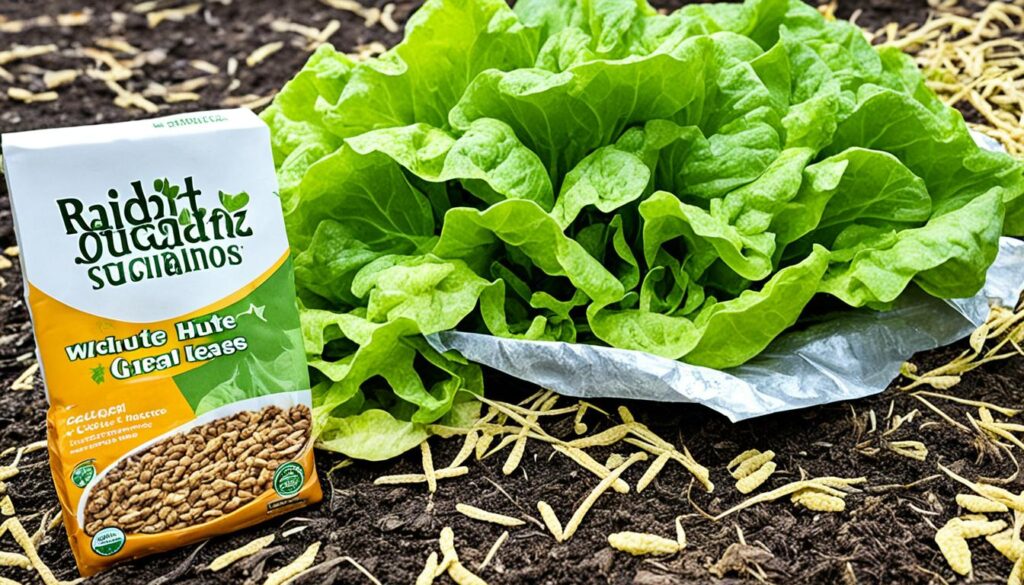
Harmful Foods: Hamster Food and Walnuts
When it comes to providing a safe and nutritious diet for your rabbits, there are certain foods that should be avoided. Hamster food and walnuts, while not necessarily toxic, can have negative effects on your rabbits’ health.
Hamster Food: While it may seem tempting to feed your rabbits hamster food, it is not suitable for their dietary needs. Hamster food is formulated specifically for hamsters and does not provide the necessary high-fiber content that rabbits require. Feeding your rabbits hamster food can lead to nutritional deficiencies and digestive issues. It’s best to opt for a rabbit-specific pellet diet that meets their dietary requirements.
Walnuts: Although walnuts are not toxic to rabbits, they can cause uncomfortable indigestion due to their high fat content. Rabbits have sensitive digestive systems that are best suited for a high-fiber diet. Consuming fatty foods like walnuts can lead to gastrointestinal upset, including diarrhea and bloating. Instead of offering walnuts as a snack, it’s recommended to provide fresh vegetables and herbs that are low in fat and high in nutrients.
To ensure your rabbits’ health and well-being, it’s important to avoid feeding them hamster food and walnuts. Instead, focus on providing them with a balanced diet that includes high-quality pellets, fresh hay, and a variety of rabbit-safe vegetables and herbs.
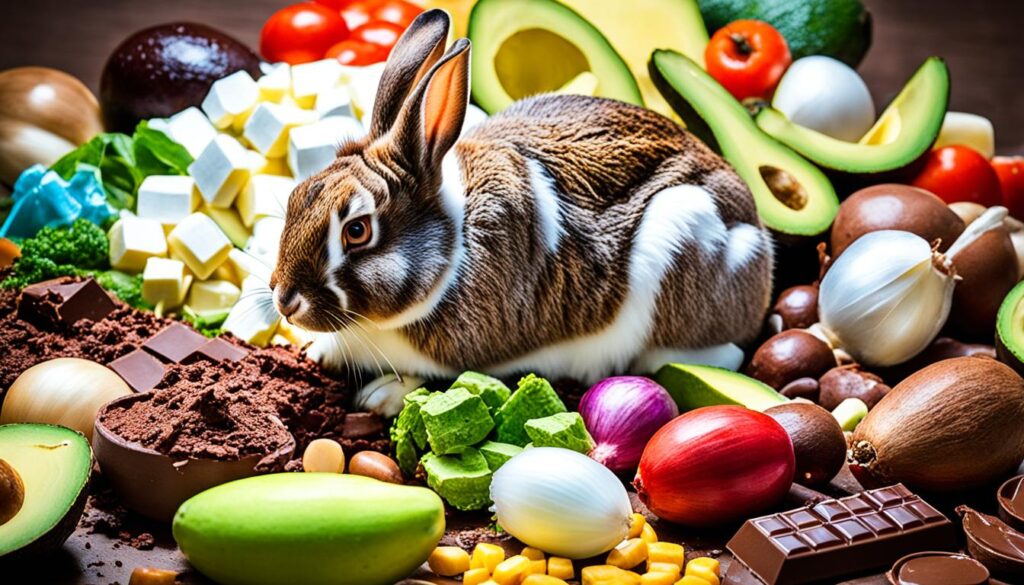
| Foods to Avoid | Reason |
|---|---|
| Hamster Food | Does not provide necessary high-fiber content |
| Walnuts | High fat content can cause indigestion |
Oatmeal, Chocolate, and Peanut Butter Are No-Nos
While oatmeal won’t cause major harm to rabbits, it is not an ideal meal for them. Rabbits require large amounts of Timothy hay, hearty greens, and fresh water for a nutritious diet. Chocolate and peanut butter, both high in fat, should be avoided as they can cause digestive upset and discomfort for rabbits.
“Proper nutrition is essential for the well-being of rabbits. While oatmeal is often considered a healthy option for humans, it does not provide the necessary nutrients that rabbits need. It’s important to focus on their dietary needs by offering a diet rich in fiber and low in fat.”
To ensure a well-rounded and healthy diet for rabbits, it’s important to avoid toxic food and provide them with a variety of nutritious options. Feeding them high-quality hay, fresh vegetables, and limited amounts of pellets is key to maintaining their overall health.
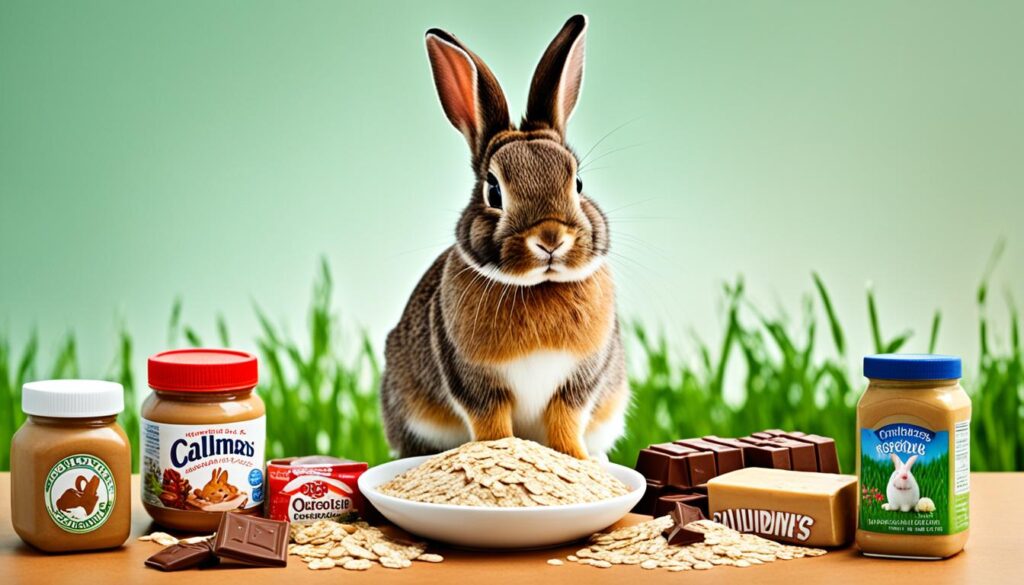
| Foods to Avoid | Reason |
|---|---|
| Oatmeal | Not nutritionally beneficial for rabbits |
| Chocolate | High in fat and can cause digestive issues |
| Peanut Butter | High in fat and can cause digestive discomfort |
By being mindful of their diet and avoiding toxic foods, owners can ensure that their rabbits lead healthy and happy lives.
Key Takeaways:
- Oatmeal does not provide the necessary nutrients for rabbits and should be avoided.
- Chocolate and peanut butter, high in fat, can cause digestive upset in rabbits and should be omitted from their diet.
- Rabbits require a diet rich in Timothy hay, hearty greens, and fresh water to maintain their overall health.
Potatoes, Rhubarb, and Meat: Not Good for Rabbits
While rabbits are known to have an insatiable appetite, it’s important to remember that not all foods are suitable for their delicate digestive systems. In this section, we’ll explore three common foods that are best avoided when it comes to feeding your furry friend: potatoes, rhubarb, and meat.
Potatoes
Potatoes may be a staple in many human diets, but they should not be a part of a rabbit’s menu. While not inherently toxic, potatoes are high in carbohydrates and starch, which can lead to digestive issues for rabbits. These starchy vegetables can cause bloating, gas, and discomfort in your furry friend’s sensitive stomach. It’s best to steer clear of feeding potatoes to rabbits and opt for other vegetables that are more suitable for their needs.
Rhubarb
Raw rhubarb is another food that should be kept away from rabbits. While humans may enjoy rhubarb pies and desserts, the leaves of the rhubarb plant contain a substance called oxalic acid, which is toxic to rabbits. If ingested, rhubarb can cause dehydration, lethargy, and even kidney failure in rabbits. It’s important to ensure that rabbits are not exposed to rhubarb in any form, whether it’s raw, cooked, or in processed foods.
Meat
It may seem obvious, but rabbits are herbivores and do not require or digest meat as part of their diet. Feeding meat to rabbits can cause severe health issues and disrupt their delicate digestive balance. Rabbits are not equipped to handle the high protein and fat content in meat, which can lead to digestive upset, obesity, and other health complications. It’s essential to stick to a plant-based diet for rabbits and provide them with the appropriate mix of hay, pellets, and fresh vegetables.
By avoiding toxic food for rabbits, such as potatoes, rhubarb, and meat, you can ensure that your furry friend’s digestive system stays healthy and happy. Instead, focus on providing a balanced diet consisting of high-quality hay, fresh vegetables, and pellets specifically formulated for rabbits. Remember, consulting with a veterinarian is always a good idea when planning your rabbit’s diet to ensure they receive the nutrients they need to thrive.
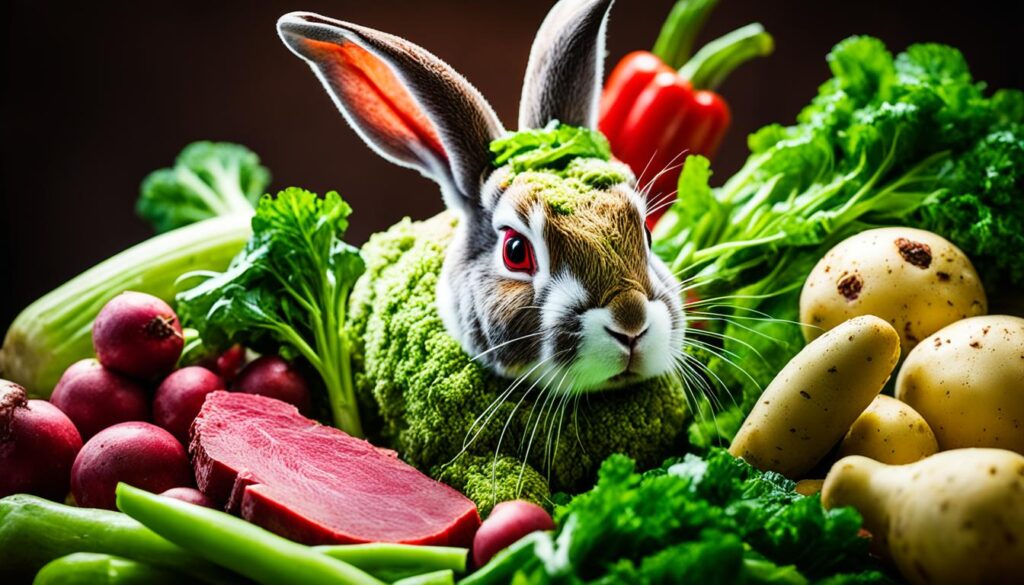
Cauliflower, Seeds, and Nuts
When it comes to the diet of rabbits, it’s important to be mindful of certain foods that can be harmful or even toxic to them. Cauliflower, while a nutritious vegetable for humans, can cause bloating and gas in rabbits. To provide rabbits with a healthier alternative, consider offering green peppers, beets, or radishes as snack options.
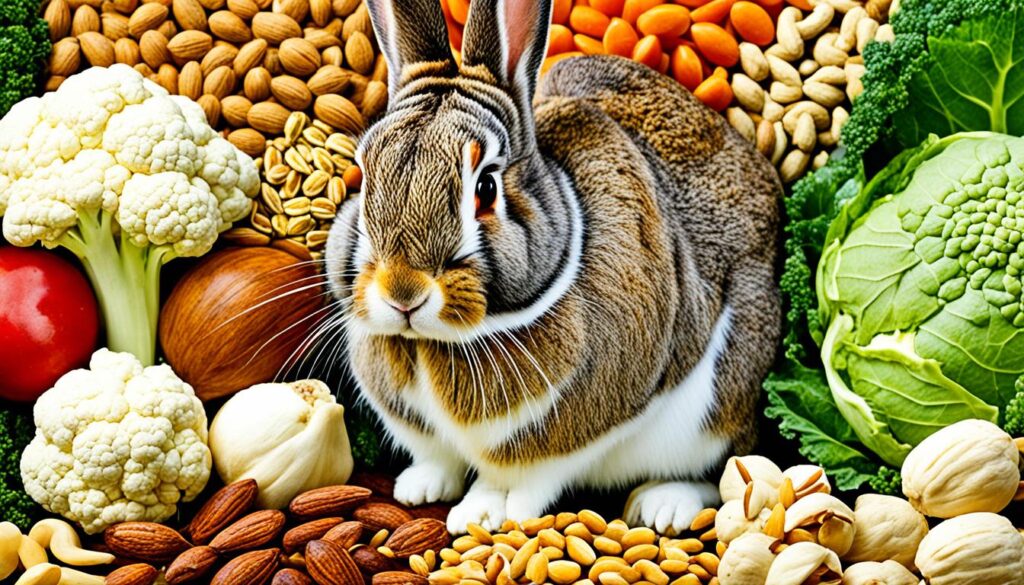
Additionally, most seeds and nuts should be avoided in a rabbit’s diet, as they can pose potential health risks. Rabbits have sensitive digestive systems that may not tolerate seeds and nuts well. However, there are a few exceptions. Sunflower seeds and pumpkin seeds can be given to rabbits in small quantities as occasional treats.
It’s important to remember that a rabbit’s diet should primarily consist of hay, fresh vegetables, and water. These provide the necessary fiber and nutrients for their digestive health. By avoiding toxic foods and incorporating a balanced diet, you can ensure the well-being and longevity of your rabbit companion.
Poisonous Plants for Rabbits
Rabbits have a curious nature and may explore their surroundings by nibbling on plants. However, it’s important to be aware that some plants can be toxic to rabbits. To keep your furry friend safe, it’s crucial to avoid exposing them to poisonous plants. Here are some plants that are harmful to rabbits:
| Plant | Toxic Parts |
|---|---|
| Aloe | Leaves |
| Apple seeds | Seeds |
| Apricot plants | Leaves, stems, and pits |
| Avocado leaves | Leaves |
| Azalea | All parts |
| Begonia | All parts |
| Chrysanthemum | All parts |
| Ivy | All parts |
These plants contain substances that can be toxic to rabbits if ingested. It’s important to keep them out of your rabbit’s reach and ensure that your rabbit’s living area is free from these poisonous plants.
To provide a visual representation, here is an image of some of the poisonous plants:
Remember, prevention is key when it comes to protecting your rabbit’s health. By being aware of the potentially toxic plants and avoiding them, you can ensure the well-being of your beloved pet.
Best Practices for Rabbit Diet and Treats
In addition to avoiding toxic foods, providing rabbits with a healthy and balanced diet is essential for their overall well-being. A proper diet ensures that rabbits receive all the necessary nutrients they need to thrive. Here are some best practices to follow when it comes to rabbit diet and treats:
The Importance of Hay, Pellets, and Fresh Produce
Hay, such as Timothy hay, should make up the bulk of a rabbit’s diet. It provides essential fiber, aids in digestion, and helps wear down their teeth, which continuously grow. Unlimited access to fresh hay is crucial for a healthy rabbit diet.
High-quality pellets formulated specifically for rabbits can supplement their diet. Choose pellets that are made primarily from hay and avoid those with excessive fillers or added sugars. Pellets should make up a smaller portion of their diet and be given in appropriate quantities, based on their size and weight.
Adding a variety of fresh fruits and vegetables is important to provide additional vitamins and minerals to rabbits’ diets. However, not all fruits and vegetables are safe for rabbits. Refer to a rabbit diet guide or consult with a veterinarian for a comprehensive list of safe options. Rotate the types of produce regularly to ensure a well-rounded diet.
Moderation with Rabbit Treats
While treats can be a fun way to interact with rabbits and provide them with extra enjoyment, they should be given in moderation. Treats should never exceed 10% of a rabbit’s daily food intake. Too many treats can lead to weight gain, digestive issues, and an unbalanced diet.
When choosing treats for rabbits, opt for healthy options that align with their dietary needs. Fresh vegetables, such as carrot tops, bell peppers, and cilantro, can make excellent treats. Dried flowers and leaves, like chamomile or dandelion, can also be enjoyable treats for rabbits.
Consultation with a Veterinarian
Every rabbit is unique, and their dietary requirements may vary based on factors such as age, weight, and health conditions. It’s crucial to consult with a veterinarian who specializes in small animals or exotic pets to ensure that you are providing the best diet for your rabbit.
A veterinarian can provide personalized recommendations on the types and quantities of treats to give to your rabbit, as well as any modifications necessary based on their specific needs. Regular check-ups with a veterinarian will help monitor your rabbit’s overall health and ensure that their diet is promoting their well-being.
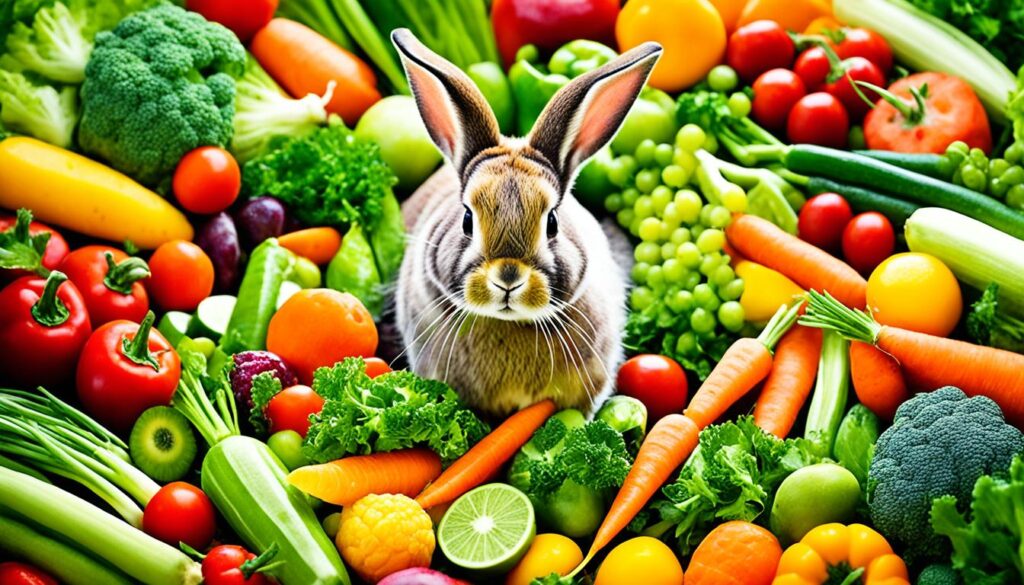
| Treat Options | Description |
|---|---|
| Fresh vegetables | Carrot tops, bell peppers, cilantro |
| Dried flowers and leaves | Chamomile, dandelion |
Common Myths and Misconceptions about Rabbit Diet
When it comes to feeding rabbits, there are several common myths and misconceptions that can lead to a less than ideal diet. These misconceptions often arise from misleading marketing practices and outdated beliefs. It’s important for rabbit owners to be aware of these myths and ensure that they are providing their furry friends with a diet that meets their nutritional needs. Let’s debunk some of the most prevalent rabbit diet myths:
- Myth 1: Rabbits can survive on a diet of only pellets.
- Myth 2: Unlimited amounts of fruits and vegetables are beneficial for rabbits.
- Myth 3: Rabbits don’t need access to fresh water.
- Myth 4: Rabbits need a constant supply of seeds and nuts.
- Myth 5: Feeding rabbits only one type of hay is sufficient.
This myth stems from the misconception that pellets alone provide all the necessary nutrients for rabbits. While pellets are an important part of a rabbit’s diet, they should be supplemented with fresh hay, vegetables, and a small amount of fruit to ensure a balanced and healthy diet.
While it’s true that rabbits enjoy fruits and vegetables, unlimited consumption can lead to digestive problems. Fruits and vegetables should be given in moderation as treats, and the focus of a rabbit’s diet should be on high-quality hay and pellets.
Water is essential for a rabbit’s overall health and digestion. Rabbits should always have access to fresh, clean water. Water bowls or bottles should be cleaned regularly to ensure hygiene.
While seeds and nuts can be given as occasional treats, they should not be a staple in a rabbit’s diet. These foods are high in fat and can lead to weight gain and digestive issues if overfed. Stick to small quantities as occasional rewards.
Rabbits require a variety of hays in their diet to ensure optimal nutrition and gut health. Different types of hay, such as Timothy, orchard grass, and oat hay, provide different nutrients and textures, which are beneficial for rabbits’ dental health and overall well-being.
By debunking these myths and misconceptions, rabbit owners can ensure that their pets are getting the proper nutrition they need for a healthy and happy life. It’s always best to consult with a veterinarian for personalized guidance on rabbit diet and nutrition.
Rabbit Diet Myths Debunked!
| Myth | Fact |
|---|---|
| Rabbits can survive on a diet of only pellets. | Pellets should be supplemented with hay, vegetables, and a small amount of fruit. |
| Unlimited amounts of fruits and vegetables are beneficial for rabbits. | Fruits and vegetables should be given in moderation as treats. |
| Rabbits don’t need access to fresh water. | Rabbits should always have access to fresh, clean water. |
| Rabbits need a constant supply of seeds and nuts. | Seeds and nuts should be given as occasional treats in small quantities. |
| Feeding rabbits only one type of hay is sufficient. | Rabbits require a variety of hays in their diet to ensure optimal nutrition. |
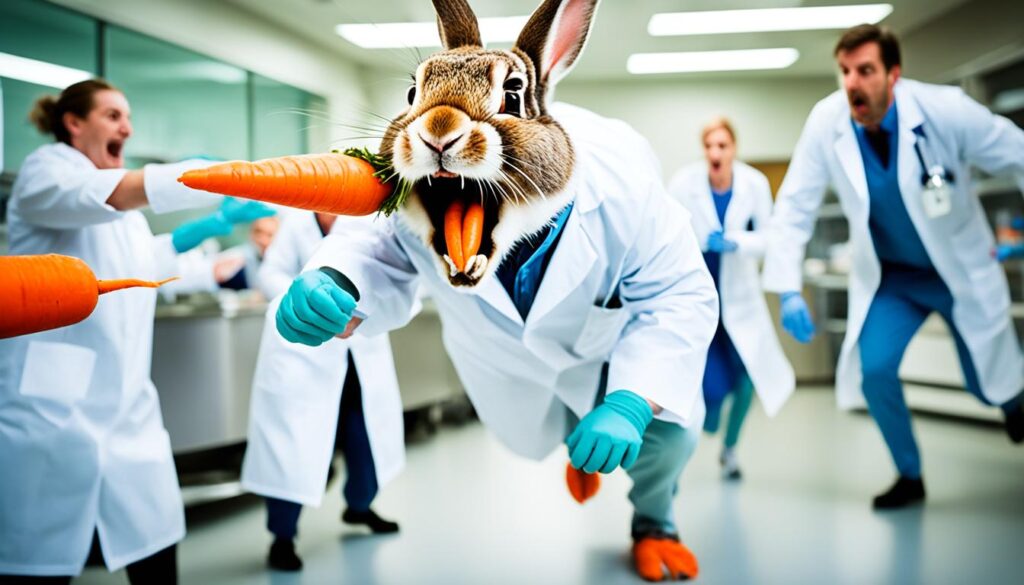
Conclusion
Understanding the importance of a safe diet for rabbits is essential for every conscientious pet owner. By being aware of the toxic foods and harmful treats, rabbit owners can ensure the well-being and longevity of their furry companions.
Creating a balanced and nutritious diet, including unlimited amounts of hay, high-quality pellets, and a variety of fresh fruits and vegetables, is crucial for a rabbit’s overall health. Avoiding foods like yogurt drops, high-sugar treats, avocado, cereal, lettuce, hamster food, walnuts, oatmeal, chocolate, peanut butter, potatoes, rhubarb, meat, cauliflower, seeds, and nuts is vital to prevent digestive issues and potential toxicity.
When it comes to providing treats, it’s best to opt for healthy alternatives like fresh veggies, dried flowers, and leaves, while always ensuring moderation. Consulting with a veterinarian for personalized guidance on rabbit’s diet and nutrition is highly recommended.
By following these guidelines and maintaining a safe and balanced diet, rabbit owners can keep their precious pets happy, healthy, and thriving for years to come.
